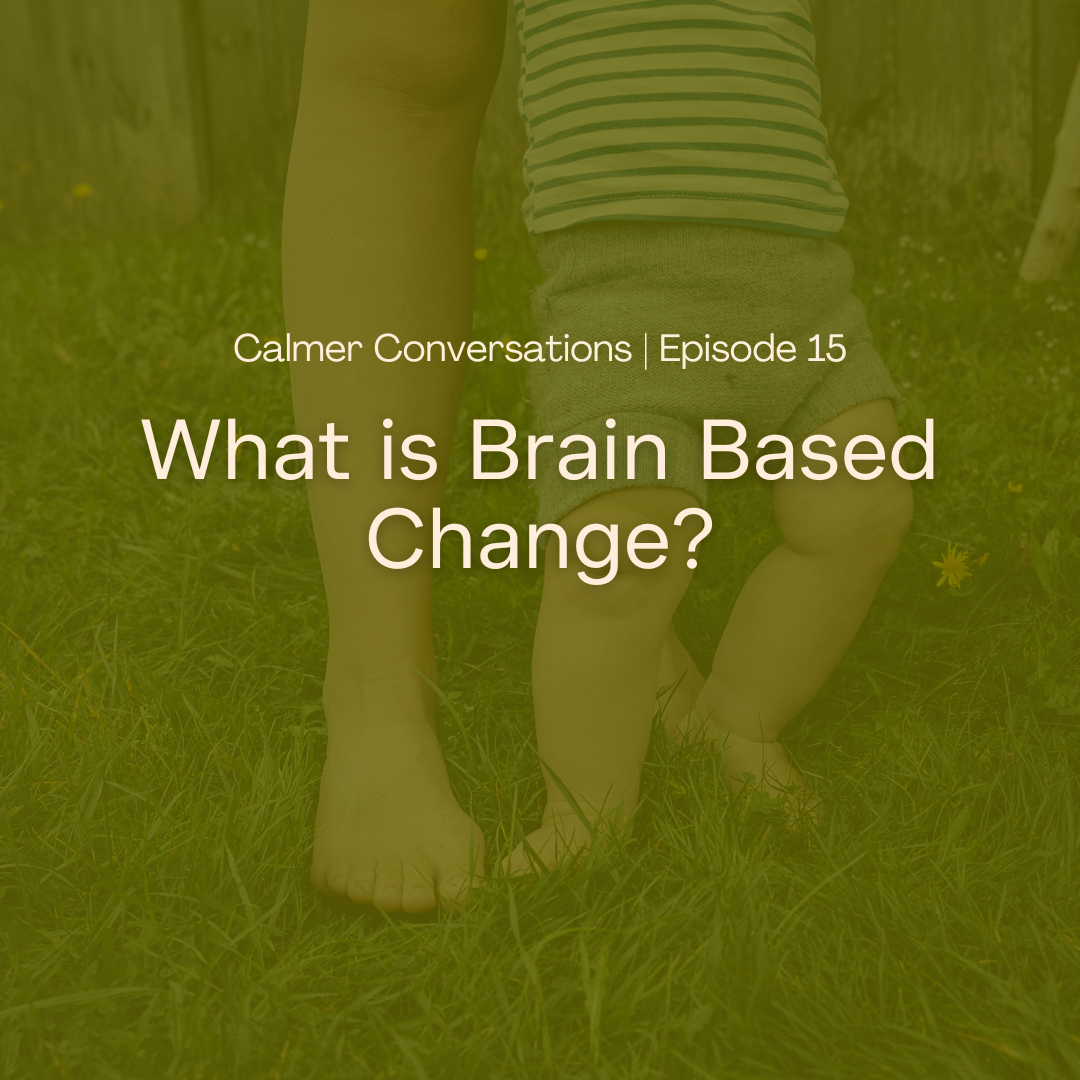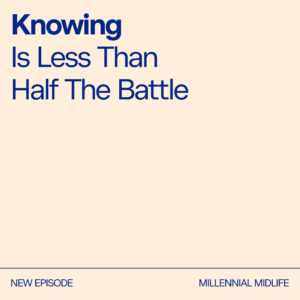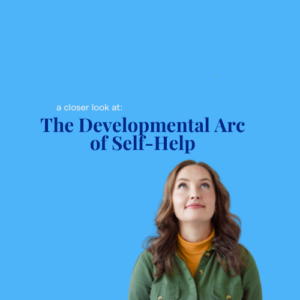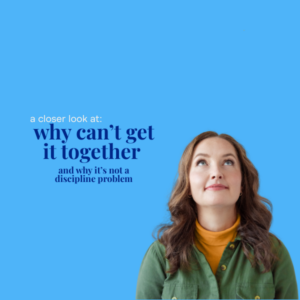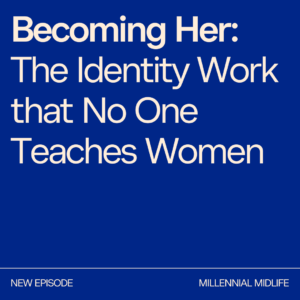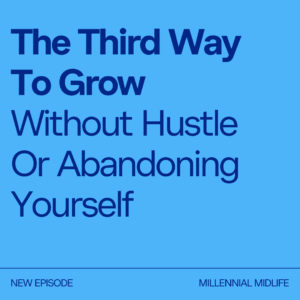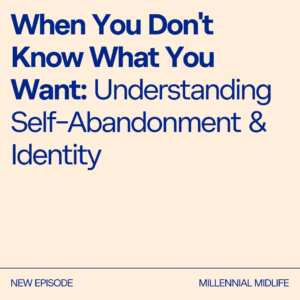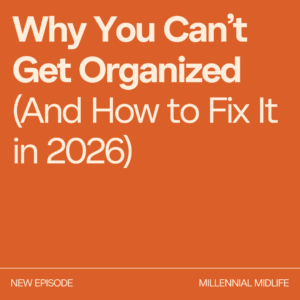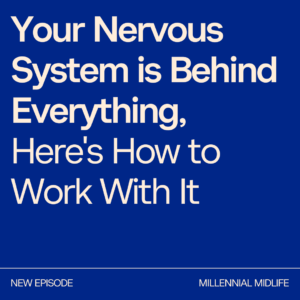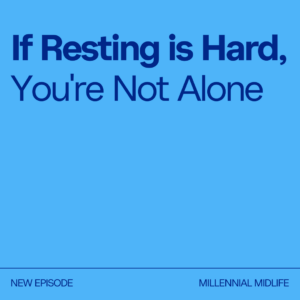Cecelia Baum Mandryk (00:04.302)
Hey and welcome to Calmer Conversations episode 15. I’m Cecilia, your host. Let’s get going. Okay. When I am talking about using your brain to change, about using a brain based approach to creating change in your life, to feeling differently, to acting differently, what I’m talking about fundamentally is understanding what’s happening in your head and working with what’s happening in your head.
understanding what’s happening in your nervous system and working with what’s happening in your nervous system so that you can create change from a root cause level, right? So you’re not using willpower or band -aids to kind of fix things with actions, but you’re understanding what’s happening. And today, this is a topic that came up in the Comma Brain Club weekly lessons. So each week we get together and I talk about a coaching concept.
and we go a little bit more in depth than I go here or I’m able to go on social media and people have a chance to ask questions and really direct what they want the topics to be. And somebody had a topic about a kind of more advanced concept which comes up when we do guided meditation in our somatic sessions. But I think that it also really relates to this really basic concept of what is a thought.
and there are a couple people in the WINS course who are newer to working with me and newer to doing this work who had this question around thoughts. So I thought, why not? Why not talk about it here? Why not give everybody who listens to me, everybody who wants to do some of this work a place to kind of start engaging with it now. Okay, so the first question is,
What is it? Well, the first questions were, what is a thought? What is a story? What is a belief? How do they play into my life and what’s happening? So that’s where we’re gonna start today. And we’ll see if we get into more of the like quantum physics manifestation place where we went in our session today. But I at least wanna get into this really diving into how thoughts impact you in your life. So if you…
Cecelia Baum Mandryk (02:12.044)
are interested in a brain -based approach to change and you’re really starting to learn, or you’ve been doing this for a long time and you just want a refresher, then this is an episode for you. I will say that usually the more one gets into the nitty -gritty of different work and does it more and more, the basics and the fundamentals and the foundations come back again and we understand how important they are. So even if you do this work,
and you think I already know what a thought is, you might consider listening to this episode anyway because you’ll probably maybe hear it in a different way because you were in a different place or you know more now or I’ll say it in a way that I haven’t said before or somebody else hasn’t said before or it lands differently. And so really just being open to hearing foundational concepts over and over again and really continuing and committing to work with them is how I think we make lasting change in general and knowing that we’re always a beginner.
and that we can always learn something is really powerful. So that being said, let’s talk about thoughts. Okay, so what is a thought? And these are definitions that I use that are used in the self -development space, in the coaching world. Mine are maybe a little bit unique to me and the work that I do specifically, but they’re kind of in that realm and I’ll try and clarify as much as possible. So a thought.
is a sentence that runs through your head at its most basic level. Right? So a thought is just the sentence that runs through your head. And so it could be something like, it’s oftentimes their judgments. Oftentimes they’re observations of some kind, but you know, it’s hot outside today or I don’t like the heat. I’m a lazy person. I don’t like crowds. That person was rude. They shouldn’t have said that.
I should have done this. I should have done more things today. That wasn’t enough. So they’re just thoughts that run through our head. Your brain has, and your brain’s not, I mean, human brains, human brains have somewhere between 30 to 90 ,000 thoughts every single day, which is a lot of thoughts, right? I mean, if you break that down, and I did some quick math in the session, so we’ll see if I can do it again. But if we have 60 ,000 thoughts,
Cecelia Baum Mandryk (04:35.694)
every day and we divide that by about 16 waking hours ish. That means you have 37, 3750 thoughts every single hour. And then if you divide that by, you have then 62 thoughts every minute. Okay, so you’re having a lot of thoughts every hour, a lot of thoughts every minute. And I think it’s really important to know this because these, well,
You don’t actually need to know that, right? You just need to know that you have a lot of thoughts, honestly, and that your thoughts are kind of happening on repeat. So you don’t have 90 ,000 or 60 ,000 unique thoughts every day. You have essentially the same thoughts on repeat over and over again within your head. The thoughts that you have, when we repeat them, when you repeat them over and over to yourself, they become beliefs.
And when I say belief, don’t mean like a religious belief, like I believe in something. I mean, it’s something that you believe to be true about yourself, about the world around you, about people you interact with, about society. It’s something that you kind of have taken to be true. And we all have many of these. We all have sets of them. And the reason why we have them is our brain. It’s like a shortcut, right? And so if we repeat something over and over again,
It creates this belief. Another way of conceptualizing the belief is saying, I’ve created a neural pathway, like a thought neural pathway or thought muscle memory kind of pair. When we repeat a series of thoughts or beliefs together, they’re kind of a story. So some of us have a story about travel, for instance. So we might think travel is stressful. Travel is always hard. It never works out for me. Things always go wrong. Right. So we have kind of a story around travel and the
I think most important thing to know about, well, most important, I’m gonna give you a couple most importants. think whenever I say the most important, then I come up with three other ones immediately in my head. Okay, to start with, the thoughts that run through your head, because you believe them, and you take them to be true, feel like the truth to you, like capital T truth. They feel very real to you.
Cecelia Baum Mandryk (07:02.874)
and these thoughts are not the truth in the universe. So whatever you repeat to yourself over and over, whatever you believe to be true about yourself, I’m lazy, I never get things right, travel is stressful, those are things you believe to be true. They feel so true to you that oftentimes we don’t even recognize them as thoughts, they just feel like our brain is reporting the news, right? It’s reporting the weather outside. These are just facts about ourselves, about the universe.
about travel, right? It’s a fact about travel that it’s stressful. But really, it’s because you have been repeating it so much that it feels true to you. At any point in time with any of these beliefs, there’s something else that you also believe. Now, the person who believes travel is stressful might not be able to believe in that moment that travel can be fun, but they might also believe that travel is fun. They might also believe that
generally they get to where they want to go. Generally things might work out at the end of the day, right? They might believe some other things. And so even when a thought feels very true to you, it is not a truth in the universe. So that’s, think, one important thing to really know, that your brain is not telling you the truth all the time. Another thing that’s important to know about your thoughts that you have and the beliefs that you have,
is they are just things you absorbed from the world around you. So you absorb them from your family of origin or your primary caregivers. You absorb them from the community you were in, from the society you’re in, from the media that you were exposed to, from any, if you were in any religion or you’re exposed to any religious ideas, you absorb them from there. And so all of these different places contribute
ideas in our head, thoughts in our head, and our brain, when we’re younger in particular, picks up on these and it learns how it needs to be, what it needs to think, how it needs to act in order to survive. And so all of the thought patterning that we have was adaptive at some point in time. It helped you at some point in time either become acceptable to people around you, to
Cecelia Baum Mandryk (09:24.588)
to kind of fit in to get your needs met, right? And so we kind of learn, we learn how to play game in many ways, or we learn, okay, if I adopt the same opinion that this person has of me, then I’m more likely to get my needs met. And so that’s important. So we learn those things. And that’s really important because then part of your brain thinks that this way of thinking is crucial for your survival.
Right? And so what that also means is not only has your brain created a neural pathway that preferentially chooses these thoughts over and over again, but your brain also doesn’t want to give up on these thoughts because they are crucial for your survival, for your brain’s survival, for your being in the world. And so part of you is very invested in keeping these thoughts. Okay. So that’s kind of from that side. Then the other thing that’s really important to know about
Say I told you there are like three or four of most importance, right? The other thing that’s really important to know and to keep in mind is that what you think shapes the reality that you see. I’m gonna say that again because it’s kind of, it’s like a little brain bendy. It’s hard to kind of wrap our brains around because we think that our brain is telling us the truth. We think that the reality that we see and what we experience is
just like kind of what everybody else is experiencing. But I don’t know if you remember the like, I can’t remember the colors, but it was like green and or blue and gold or some other colors of dress. Like we see different things. Our eyes don’t actually seem to see the same colors. What your brain interprets as reality is very driven by the thoughts you have. And I’m gonna unpack that a little bit so we can kind of play with it, but just kind of like sit with that for a minute, right?
the thoughts I have, the stories I tell myself, travel is stressful, they actually create the reality that I see in the world. They drive the reality that I see in the world. So let’s talk about that from a brain perspective, right? So from a brain perspective, what’s actually happening is your brain is inundated with information all the time, like way more information than you can process. And so your brain,
Cecelia Baum Mandryk (11:41.196)
Because again, survival is key and it doesn’t want to spend all of its time processing all this sensory information that it’s receiving about your lived reality. It starts to filter things and it needs some way to filter, right? It needs like guidance on how to filter. You might think of this. I use this example a lot like a retrieving dog. It could retrieve anything, right? You have to train it what to retrieve and you tell it, OK, I want you to retrieve the orange duck toy, right? That’s the thing I want you to retrieve. Or now I want you to retrieve the green ball. And so.
you’re telling it what to retrieve. Your thoughts are like the person training the dog and what to retrieve. So when what you think trains your brain on what to retrieve, the information that it brings into your brain, this is related to your reticular activating system, if you’ve ever heard about that. And so all the information that’s out there in the world, your brain has these filters based on what you’re thinking. So somebody who’s traveling, who thinks travel is stressful,
will have, even though they might have the objectively the exact same trip as somebody else, they will have a different experience if their belief is travel is stressful and the other person’s belief is travel is fun and things usually work out in my favor. And that is simply because their brain is looking for and feeding them different information. And I know this is…
I mean, I remember when I first learned about it, was like, nah, that’s not true. Like that can’t actually be happening, but it’s actually what’s happening in your brain, right? So how you experience reality, not just how you feel, because whatever you think, I mean, you can play with this. If you think different things, you actually feel different ways, right? For instance, if you’re driving your car to an appointment, if you feel like you’re driving along thinking like, I have plenty of time and then all, and you’re feeling like maybe good, maybe happy.
relax, maybe you’re not thinking at all about where you need to be. And then all of a sudden you look at the clock and you like momentarily misread it and you think I’m behind. Most of us will feel like the sense of adrenaline or panic or something happening in our body because the thought changed. Nothing else changed, right? Like we just had a different thought. Before we thought we had plenty of time and now all of sudden something, maybe again, you misread the clock or maybe you were actually never earlier than you thought you were.
Cecelia Baum Mandryk (14:05.302)
And all of sudden your brain says, like we’re in trouble, we’re late. A different thought creates a different feeling in your body. Nothing has actually changed, right? Nothing on the outside has changed, but your perception of it has changed. So when you have these larger scale beliefs about yourself or about your society or about the world around you, it shapes how you experience it.
Right? I don’t want to, like, I’m not gaslighting some bigger societal issues here. What I’m trying to say is that each of us have a different lived reality based on the thoughts we have. And the thoughts you have will cause you to see different things in the world. They will cause you to have a different experience, again, because your brain is retrieving different information for you.
And this is just, I think, so powerful to know if you want to feel different or you want to act different in the world, because all of sudden, you understand what’s happening in your brain. Like, I already have these neural pathways. The neural pathways point me to this belief that there’s never enough, that I never have enough. I never have enough money. And so every time I look at my bank account or I have to pay a bill, I get kind of freaked out because I just keep thinking I don’t have enough. I don’t have enough.
Every time I go on a trip, think travel is stressful and I get kind of anxious a week beforehand and I don’t know what to do with it. And I kind of start having almost panic attacks and it becomes this whole thing. And I just keep thinking travel is stressful. Okay. When we start to take the brain -based approach to change what we’re doing, the first step, and if you remember this from like kind of the essential series that I did is becoming aware of the thought pattern you have, the story that you are telling, the beliefs that you have.
What is your brain telling you that’s causing you to feel anxious about your upcoming trip? That’s maybe everything goes wrong when I travel. It always takes so much longer than I think it’s going to. I’m always so exhausted at the other end. These things can sound like facts to you, but really you have not gone on this trip yet. And so you are telling a story about your past, but essentially what you’re doing is you’re bringing your past into your future because you are
Cecelia Baum Mandryk (16:23.474)
rethinking these things, you’re re bringing them up in your brain, you’re reactivating that neural pathway, and then you are more likely to go down it as you travel. outside circumstances, notwithstanding, you will experience reality mostly shaped by your thoughts, right? And I’m not saying the outside circumstances don’t play any role at all, but they but that your thoughts really shape how you interpret them. Right? I have I’ve
traveled quite a bit in my life. used to travel really regularly, both for work and for pleasure. And I had this, I just decided at some point, like travel was gonna work out for me, right? And I have had, I mean, on paper, very terrible travel experiences, right? Like stuck in airports for very long periods of time, like all kinds of, I mean, I’ve never, I’ve actually had very good travel experiences too, but there’ve been some that haven’t maybe gone as exactly as planned, right?
But because I have this belief that travel is fun and it usually works out, even the experiences that were objectively sort of bad, I have really positive memories of them and there were fun things that happened. For instance, like one time when I was delayed in an airport, I ended up getting a massage, which I’d never done in an airport before. Another time I got a pedicure. Another time we were delayed for many, many hours and like formed this little friend group with people and we ended up like getting dinner together while we waited.
And I recently got an email from them, right, with a picture, because this is about five years ago now. So knowing that how you think shapes what you experience is really powerful. And knowing that the more I become aware of what I’m thinking, the more I will become aware of what my brain is using to shape reality. And when I’m aware of what my brain is using to shape reality,
and I take it with a light touch. don’t judge it. I don’t make it right or wrong. I just kind of start to play with it. I wonder what it would be like if I thought something else. wonder what, I wonder if I’m open to thinking something else or believing something else. All of sudden, you have infinitely more possibilities on what you can experience. And this goes from everything from like, how do I handle my child when they’re having a meltdown, to travel, to like your relationship with money, to like everything in the world, right?
Cecelia Baum Mandryk (18:44.564)
your partnerships or your relationships you have with friends or spouses or parents. And so what I’m doing with people and what we do inside places like the Calmer Brain Club is we start to play with this, with our thoughts, with what’s happening because we also know that thoughts are the key to all the other things, all the other, everything flows from what you’re thinking, right? So how you feel and what you end up doing.
and the experience you have in your reality, the results that you see in your life, those all come from the thoughts that are happening in your head. And this isn’t to put pressure on you to have really amazing thoughts all the time. I mean, like you’re a human, right? You’re not going to probably have perfect thoughts all the time.
But what you can make a commitment to doing is you can make a commitment to saying, wonder what my thoughts are around this topic. Like for instance, travel, if travel is really stressful to you or big, maybe writing public transportation, if you feel a of anxiety around that or public speaking or taking your kids to school or doing drop -off or whatever it is, saying, I wonder what my thoughts around this are. I wonder what my story is. And I wonder what it would be like. I wonder if I’m open to changing it. And then I wonder what it would be like to believe something different.
And again, when you start to open yourself up here, what you’re doing is, I use this example of like a knotted necklace, like a chain, like a delicate chain necklace, has like, 10 knots in it or something. We’re not trying to rip it apart really quickly and change everything immediately. What we’re trying to do is we’re just trying to delicately figure out where’s the easiest way and what can I, how can I start to work with my brain? How can I use a light touch here to start to shift and change things? And when you do that,
you’ll be surprised how quickly shifts and changes can happen. What we’re doing, to give you an idea of some of the other ways that I actually work with us with people, so in the WINS course, what we’re specifically doing is we’re asking at the end of the day, what went well, what am I proud of today? Because most of us inadvertently have this question, this filter in our brain of what went wrong today, what could I have done better? Where should I have been more? And that’s what we answer.
Cecelia Baum Mandryk (20:56.172)
And what we’re doing instead is we’re intentionally asking the question, what am I proud of? What went well? And then we’re answering that question. And what do I want to go well tomorrow? Which we’re setting ourselves up for a different tomorrow by asking our brains that before we go to bed or at the end of our day. I’m in the common brain club. People come with all these things, which again, it’s very hard to recognize sometimes when you’re having.
thoughts because they seem so real and true to you. So people come to coaching and what coaching really is about is somebody saying like, okay, I have a trip coming up and I feel awful about it. And I really don’t want to feel this way about my trip. I want to look forward to it. And we talk through it and we figure out what their primary thoughts are so that we can shift and change them. And I have this great example and I’ve given it a couple of times in workshops of this person that I worked with who had a lot of trouble cleaning their toilet. And
I mean, they could clean their toilet like they were totally able to, but when it was on their list of things to do, what would happen is they would end up on their couch with kind of a backache for a couple hours scrolling on social media. And they really didn’t understand what was happening. It’s really easy at that time to judge ourselves or our actions, to judge, you know, she was diagnosed with ADHD, so we can judge that. We could judge like, she has a story about being lazy or like I never follow through on things or I’m disappointing a spouse or a partner or whatever it is, right?
I’m not clean, all these different stories that might come up. But instead of judging ourselves and the actions, what we did is start to get curious. Okay, well, what else is happening? What’s going through your brain when you’re about to the toilet? And this person had a story about when they were younger, they cleaned a toilet and their mom gave them feedback that they didn’t do a good job, right? And so they kind of, at least in their brain, kind of got in trouble for not doing a good job cleaning the toilet.
And so now what happened in their brain is their brain associated cleaning the toilet with getting in trouble with potentially then not being kicked out of their tribe or not getting their needs met. And so what they did, their brain made it dangerous to clean the toilet. And so what their brain is doing by putting them on the couch and having them scroll social media is actually a totally adaptive survival mechanism. It’s getting them not to clean the toilet because the toilet is dangerous. Cleaning the toilet is dangerous. They don’t want to get in trouble. They don’t want to get kicked out of their tribe.
Cecelia Baum Mandryk (23:16.352)
And so from that place, all of a sudden it makes total sense why they’re not cleaning their toilet. And then we can start changing their thoughts from that place so that they’re no longer forcing themselves to do something or judging themselves for not doing something. They’re understanding what’s happening in their brain. And then we’re working from that place. And that is what this work is all about. Okay. I hope that this is really helpful. I mean, like I said, I think we can come back to something like what are thoughts over and over again.
But understanding if you’re working with your brain to make changes in life understanding what’s happening in your brain is crucial for that understanding the stories and I will say again even though part of your brain will say awareness is not enough awareness is really The place where all of this starts and so having the commitment or the intention to become aware of your thoughts around something specific
is maybe one of the most powerful things you could do right now if you want to make shifts and changes. All right. Thank you so much for being here this week. I will think about this, like to see if it makes sense or it doesn’t make sense. Try it out in your own brain. Come say hi on social media or send me an email. I’d love to hear how this is landing for you. And I will see you next week. All right, bye.

